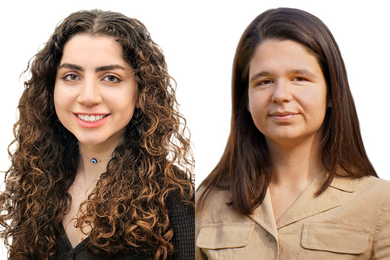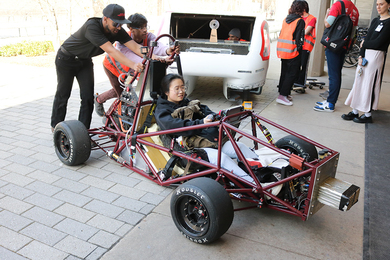Provost Joel Moses has formed four Institute-wide councils-focused on the environment, educational technology, international relationships and industrial relationships-to help MIT set its course for the future.
"These Councils are involved in areas of growing importance to the Institute in both instruction and research," Professor Moses said. "They are an important part of a strategy for dealing with potential changes in federal and industrial support of research and graduate education."
President Charles M. Vest said, "These councils are intended to blend vision and implementation, which will help define new directions for MIT and create new opportunities for us. They will work to identify intellectual and educational challenges of broad Institute significance, develop resources to accomplish them, and attain a certain nimbleness for the institution by integrating the efforts of faculty and senior administrators in a new way."
Each council is chaired by a member of Academic Council and has one or more faculty members as co-chairs.
The Council on the Environment is a reorganized version of the Provost's Council on the Global Environment that was created by former Provost Mark S. Wrighton in 1991.
The council is chaired by Professor Moses, with Professor David H. Marks, director of the Program in Environmental Engineering Education and Research, as co-chair. Much of the work of this council will be facilitated by an executive committee chaired by Dr. Marks.
"The environment has been an area of growing importance throughout the Institute for a number of years," the Provost said. "Research in the area is often funded by industry, and just as often takes place in part in foreign regions."
The Council on Educational Technology is chaired by Dean William J. Mitchell of the School of Architecture and Planning, with Professor Michael L. Dertouzos, director of the Laboratory for Computer Science, as co-chair.
"Educational Technology is increasingly important as several schools at MIT begin to rely on remote education, both in the US and in foreign countries," the Professor Moses said. "In addition, the Athena system, while arguably the best of its kind in US universities, needs to be reexamined periodically, given the continuing rapid changes in computing and communications."
The Council on International Relationships is chaired by Associate Provost Phillip L. Clay and co-chaired by Professors Suzanne Berger of the Department of Political Science and Fred Moavenzadeh, director of the Technology and Development Program, the Center for Construction Research and Education and the Henry L. Pierce Laboratory.
"We continue to be approached by organizations as well as alumni in a number of countries to help them develop education and research programs in various areas," the Provost said. "The Institute needs to understand its strengths and limitations in considering such arrangements. We wish to extend the opportunities for our students and faculty to study and perform research in various countries. On the other hand, past experiences by MIT and other universities may require us to be somewhat cautious in entering new arrangements."
The Council on Industrial Relationships is chaired by Dean Glen L. Urban of the Sloan School of Management and co-chaired by Professor Daniel Roos, director of the Center for Technology, Policy, and Industrial Development.
"While industrial support will likely not fully make up the potential loss of federal support for research, it will likely be a significant area of growth," Provost Moses said. "The Institute needs to develop policies regarding partnerships with companies, such as the one that was concluded in 1993 with Amgen. This Council will work closely with the standing faculty Committee on Corporate Relations."
Each of the Councils drafted a short statement regarding its mission.
COUNCIL ON THE ENVIRONMENT
MIT is poised to assume a leadership role in the search for solutions to increasingly complex environmental problems and to prepare future leaders in government, industry and academia to deal with these problems in the future. The Council will thus focus on developing innovative new programs within MIT and in partnership with other institutions around the world to meet four objectives:
��������������������������� to strengthen disciplinary depth and multidisciplinary research cooperation on environmental problems across schools and programs
��������������������������� to increase the environmental literacy of all our students and faculty
��������������������������� to explore the best means and develop an action plan for outreach and dissemination of our knowledge on the environment to decision-makers in government and industry and to the public
��������������������������� to develop and implement strategies and policies to secure the resources that will be needed to achieve our objectives in research, education and outreach.
COUNCIL ON EDUCATIONAL TECHNOLOGY
The Council is charged with considering the potential benefits that MIT's educational mission might derive over the next decade from effective application of emerging computer and telecommunication technologies, to explore alternative strategies for achieving the most important of these benefits, to describe a vision for the future, and to make a concise, concrete set of recommendations for action. It should aim to produce its first report by the end of the 1995-96 academic year.
The Council should take a comprehensive view, encompassing both on-campus and distance learning activities, the educational implications of global networking, the role of shared institutional information-technology resources (in particular, Athena), and the roles of departmental and individual resources (including student-owned machines). It should explore proven, promising and speculative approaches to technologically supported education. It should consider possible alliances with other organizations.
COUNCIL ON INTERNATIONAL RELATIONSHIPS
World globalization is marked by rapid development in previously undeveloped nations. In this emergence, science, technology, management and development policy will be critical to the success of national strategies. MIT is in an excellent position to collaborate with institutions, corporations and governments in educational and research initiatives in this emerging environment. In addition, MIT has opportunities to work with peer institutions in Europe and elsewhere on large projects that increasingly require collaboration across national boundaries.
While many faculty members have considerable international experience and MIT is active in several projects, the many new opportunities require that we develop a strategic approach to these collaborations that starts with an interest on the part of faculty and advances our primary mission as an educational and research institution. We also want to make sure that the initiatives are complementary, that they take advantage of competitive advantages, that they offer promise for substantial impact, are sustainable, and that they make a contribution to the financial strength of the Institute.
In considering these initiatives, the Council will look for new approaches to working with existing partners and in developing new ways to work with corporations, international alumni, foreign governments and international institutions.
The Council will recommend strategies, advise the administration on issues of international collaboration and help guard against efforts that dissipate the energy of the faculty or compromise the institute interest.
COUNCIL ON INDUSTRIAL RELATIONSHIPS
The nature of engineering, the relationship between science and technology and the structure of industries are undergoing major transformations. As the leading institution of higher education focused on science and engineering, MIT must both lead and respond to these transformations.
The Council on Industrial Relationships should explore and recommend how MIT's relationship with and linkages to industry should be shaped in order for us to prosper and serve well in this emerging area. The Council should develop innovative new programs and relationships that serve industrial needs and that support MIT's missions in education, research and public service. The Council should determine the MIT policies, procedures and organizational structures that are appropriate to encourage and support these programs and relationships.
The initial focus of the Council will be to develop industrial partnerships-long-term, large-scale relationships between MIT and industrial companies to pursue significant research, educational and public service initiatives.





